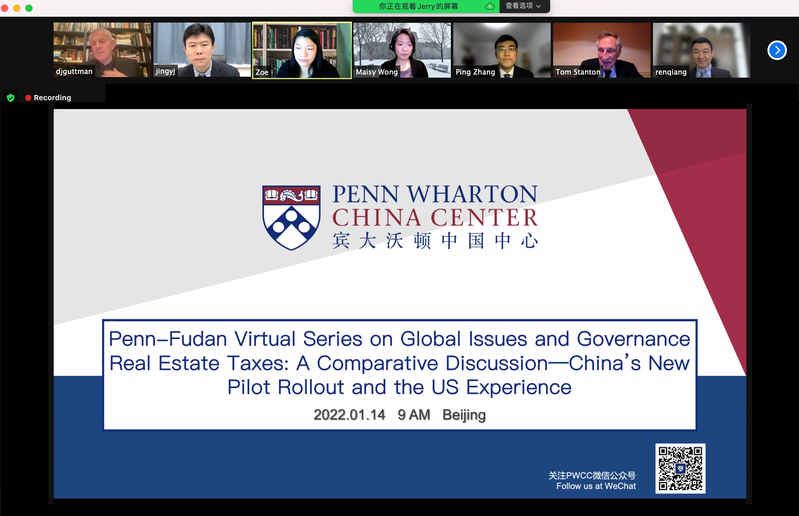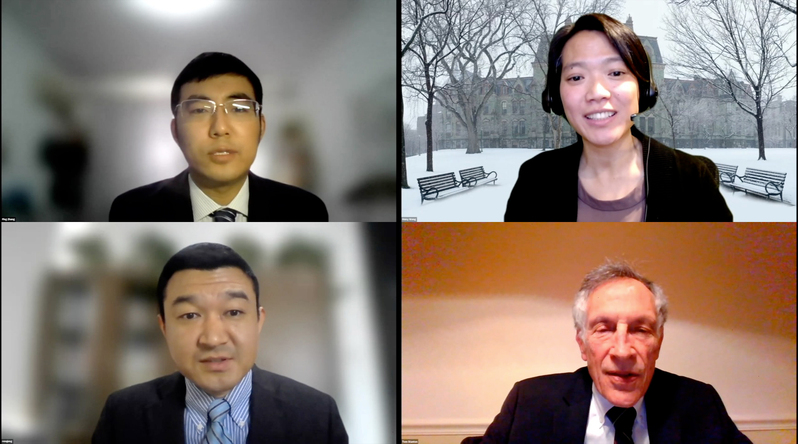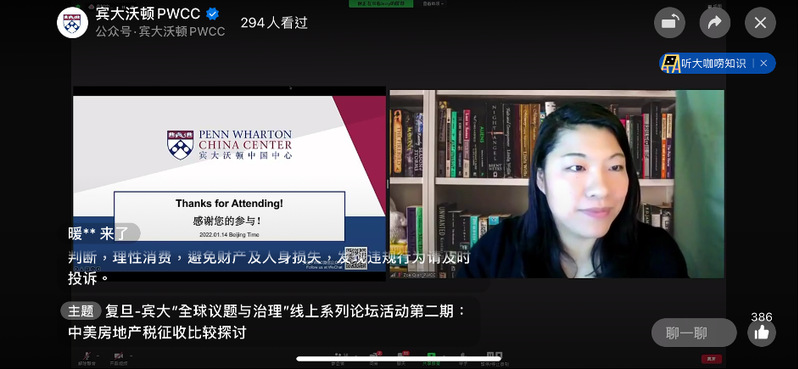
On 14th January 2022, the Institute for Global Public Policy (IGPP) and the Penn Wharton China Center (PWCC) jointly held the second event of the Fudan-Penn Virtual Series on Global Issues and Governance “Real Estate Taxes: A Comparative Discussion—China’s New Pilot Rollout and the US Experience”. Over 400 scholars and researchers participated in the virtual event.
The event invited four scholars from China and the US to have a comparative discussion on the property taxes reform and multiple relevant issues. Professor Ping Zhang is the Assistant Dean of IGPP and an Associate Professor at the School of International Relations and Public Affairs at Fudan University. Professor Qiang Ren is the Director of Center for Fiscal Research and Professor at the School of Public Finance and Taxation, Central University of Finance and Economics. Professor Maisy Wong is the James T. Riady Associate Professor of Real Estate at the Wharton School of the University of Pennsylvania. Professor Thomas H. Stanton is the Former President of the Association for Federal Enterprise Risk Management (AFERM) and Adjunct Professor at Johns Hopkins University. The event was moderated by Professor Dan Guttman, Adjunct Professor of IGPP.

Ms. Zoe Qiao, Senior Associate Director of PWCC, gave the welcome remark first. She then invited Professor Yijia Jing, Dean of IGPP, to give the opening remark. Professor Jing pointed out that the commercial market of residential housing in China has developed very fast since its emergence in the 1990s. Residential housing has firmly become a pillar industry and has greatly shaped China's economy, public finance, and individual lives. The market value of residential housing in China is now about twice that of the US. The property tax pilot introduced in 2003 in Shanghai and Chongqing has yet made property tax an effective revenue source for local governments. At the end of 2021, the National People’s Congress of China had authorized the central government to spread pilot tax to more cities with deeper strength. Is this new policy a game changer to the new equilibrium? In which ways China may learn from the practices of the US? Those questions had underlined the significance of this event. He then introduced the four speakers and the moderator.

The four speakers gave their keynote speeches in the first session. Professor Zhang gave a speech on the topic “Is China’s property tax a game changer?” He introduced the policy goals of property tax reform in China, and its impacts on the housing market and local governments. He suggested a gradual and incremental reform path of property tax in China to ensure the stability of the real estate market. Drawing on the US experience, Professor Wong expounded on the close connection between property tax and local public services to demonstrate why we need property taxes. She stated that “distortion minimization”, “equitable and transparent” and “political acceptability” are the three general principles to follow in property tax design. Professor Ren raised four questions on property taxation in his speech: whether it is a revenue instrument or a policy tool; whether it is a legislative process or a budget process; whether it is a local tax or with some redistribution elements; and whether it is based on leasehold or freehold system? He then shared lessons from Japan, South Korea, and Chinese Hong Kong in property tax reform to answer the above questions. Professor Stanton discussed the political strength in the property tax reform of Proposition 13 in California and emphasized the importance of a balanced tax system to minimize distortion. He indicated that “legitimate”, “professional” and “easy to pay” should be taken into consideration in the design of the property tax system.

In the Q&A session, Professor Guttman raised several questions, two of which had fueled heated discussions. The first question was, “do you have a suggestion for the people who have some property, what should they do?” Professor Wong pointed out that there were many determinants of housing prices. The focus should be put on the economic fundamentals. For the mature real estate market, collecting property taxes would not lead the housing prices to collapse. Professor Zhang stated that the property tax pilot policies in Shanghai and Chongqing were designed under the principle “the old people, old policy; the new people, new policy”. There were also generous tax reductions and exemptions, so its impact should be limited. Professor Ren further introduced the reduction and exemption standards and specific plans of property tax in Chinese Hong Kong, Japan, and South Korea.
The second question was, “what local public services should be financed by property tax in China's context?” Professor Zhang stated that the property tax revenue was mainly used for public education in the US. As education may be closely linked to opportunities in social mobility, local governments should provide low-cost or free supplies (such as compulsory education). He suggested that spending property tax revenue on building recreational infrastructure (such as parks and stadiums) should promote social justice in a better way. Professor Stanton again mentioned the issues of social inequality and tax revolt in tax reform. He further emphasized the importance of learning lessons from policy pilots.

Professor Jing summarized the discussion after the Q&A session. He stated that property tax reform is a typical dilemma of decision-making that reconciles multiple policy objectives. These policy goals may have some synergistic effects but also lead to competition and conflicts. Since a large number of different interests and actors are involved, the government should create a favorable institutional framework for cooperative gaming between stakeholders and balance the benefits and problems. The complexity, uncertainty, and sensitivity of the reform and pilot experience in Shanghai and Chongqing revealed that the current reform was not solid and deep enough for national policymaking. Subsequent reforms should be carried out in the form of local pilots rather than central legislation. He also highlighted the importance of making decisive steps in incremental reforms. He pointed out that China has a wealth of foreign experience to learn, while she has to make wise judgments on what can be learned and what should be learned. He encouraged those scholars and audiences who participated in the event to continue this “dialogue” and carry out promising research cooperation.
Prof. Guttman and Director Qiao concluded the dialogue and welcomed the audience to participate in the next event in this spring.




